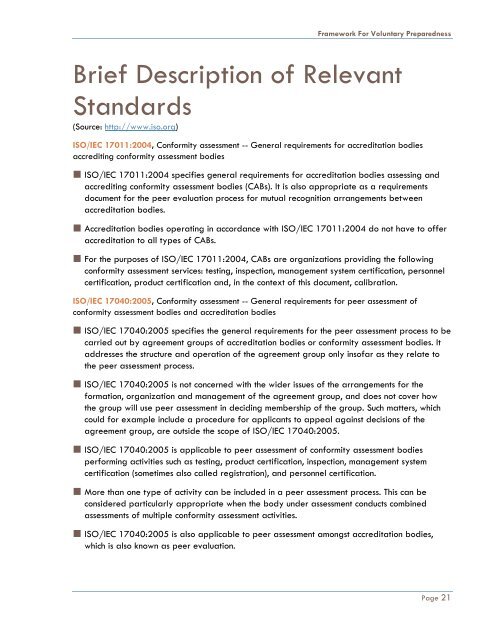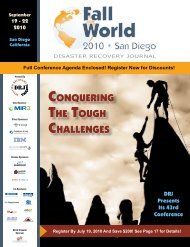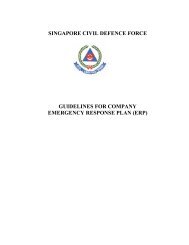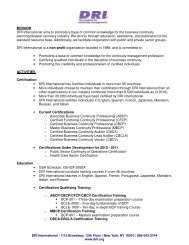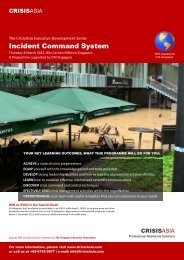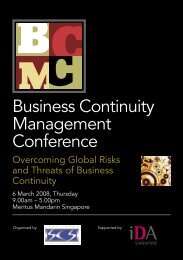Framework for Voluntary Preparedness - Association of Contingency ...
Framework for Voluntary Preparedness - Association of Contingency ...
Framework for Voluntary Preparedness - Association of Contingency ...
You also want an ePaper? Increase the reach of your titles
YUMPU automatically turns print PDFs into web optimized ePapers that Google loves.
<strong>Framework</strong> For <strong>Voluntary</strong> <strong>Preparedness</strong><br />
Brief Description <strong>of</strong> Relevant<br />
Standards<br />
(Source: http://www.iso.org)<br />
ISO/IEC 17011:2004, Con<strong>for</strong>mity assessment -- General requirements <strong>for</strong> accreditation bodies<br />
accrediting con<strong>for</strong>mity assessment bodies<br />
• ISO/IEC 17011:2004 specifies general requirements <strong>for</strong> accreditation bodies assessing and<br />
accrediting con<strong>for</strong>mity assessment bodies (CABs). It is also appropriate as a requirements<br />
document <strong>for</strong> the peer evaluation process <strong>for</strong> mutual recognition arrangements between<br />
accreditation bodies.<br />
• Accreditation bodies operating in accordance with ISO/IEC 17011:2004 do not have to <strong>of</strong>fer<br />
accreditation to all types <strong>of</strong> CABs.<br />
• For the purposes <strong>of</strong> ISO/IEC 17011:2004, CABs are organizations providing the following<br />
con<strong>for</strong>mity assessment services: testing, inspection, management system certification, personnel<br />
certification, product certification and, in the context <strong>of</strong> this document, calibration.<br />
ISO/IEC 17040:2005, Con<strong>for</strong>mity assessment -- General requirements <strong>for</strong> peer assessment <strong>of</strong><br />
con<strong>for</strong>mity assessment bodies and accreditation bodies<br />
• ISO/IEC 17040:2005 specifies the general requirements <strong>for</strong> the peer assessment process to be<br />
carried out by agreement groups <strong>of</strong> accreditation bodies or con<strong>for</strong>mity assessment bodies. It<br />
addresses the structure and operation <strong>of</strong> the agreement group only ins<strong>of</strong>ar as they relate to<br />
the peer assessment process.<br />
• ISO/IEC 17040:2005 is not concerned with the wider issues <strong>of</strong> the arrangements <strong>for</strong> the<br />
<strong>for</strong>mation, organization and management <strong>of</strong> the agreement group, and does not cover how<br />
the group will use peer assessment in deciding membership <strong>of</strong> the group. Such matters, which<br />
could <strong>for</strong> example include a procedure <strong>for</strong> applicants to appeal against decisions <strong>of</strong> the<br />
agreement group, are outside the scope <strong>of</strong> ISO/IEC 17040:2005.<br />
• ISO/IEC 17040:2005 is applicable to peer assessment <strong>of</strong> con<strong>for</strong>mity assessment bodies<br />
per<strong>for</strong>ming activities such as testing, product certification, inspection, management system<br />
certification (sometimes also called registration), and personnel certification.<br />
• More than one type <strong>of</strong> activity can be included in a peer assessment process. This can be<br />
considered particularly appropriate when the body under assessment conducts combined<br />
assessments <strong>of</strong> multiple con<strong>for</strong>mity assessment activities.<br />
• ISO/IEC 17040:2005 is also applicable to peer assessment amongst accreditation bodies,<br />
which is also known as peer evaluation.<br />
Page 21


